凤凰职教第二册第三单元复习课教学案
凤凰职教第三册Unit3电子教案学习资料
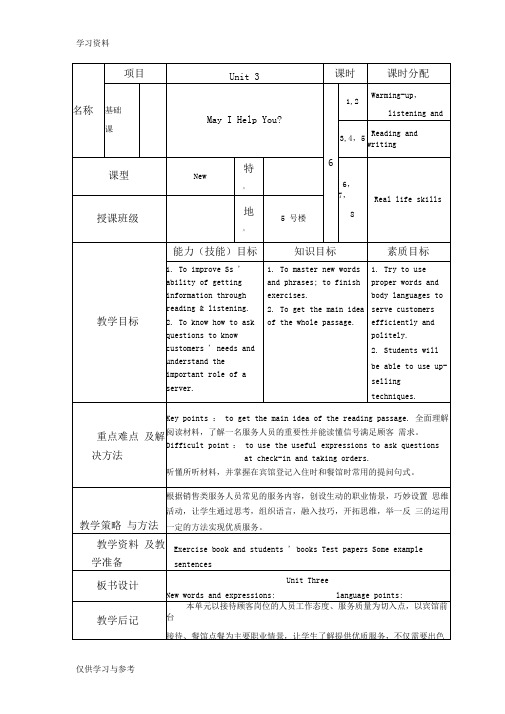
I'll ring the hotel. I'll tell them we'll check in tomorrow... 我来给旅馆打电话,通知他们我们明天入住。
→ Check out 结账离开,结账退房They packed and checked out of the hotel. 他们收拾好东西,办理了退房手续。
I was disappointed to miss Bryan, who had just checked out...我非常失望没有见着布赖恩,他刚退房走了。
→ Reservation[?rez?'ve ??n] n. 预定,预约He went to the desk to make a reservation... 他到服务台进行了预订。
Do you have a reservation? 你有预定吗?→ manage ['m? n?d?] vt. 管理,经营Mr. Smith manages a large department store. 史密斯先生经营一家大型百货公司。
→ manage to do sth 经过努力克服困难,设法做成某事Given a chance, I will manage to do the work well. 如果给我机会,我会设法做好这项工作。
Unit Three 第二课时(在餐馆) Listening &Speaking BStep Two:L isteningActivity1 :Look at the picture. What did the customer order? Tick ( √) from the list. Activity 2:Extensive listening Listen to the conversationa nd circle the correct answers..Activity 3:Intensive Listening Listen again and complete the order sheet for the waitress.Step Three : Arrangement Arrange the sentenceb elowto make a conversation between customer and a waiter in a coffee shop. Waiter: Are you ready to order sir?Customer: Yes, please.' dI like a cup of coffee. Waiter: Cream and sugar? Customer: Just blac'sk fine. Waiter: Anything else, sir? Customer: And a piece of toas Waiter: Certainly, sir. Coming right up.Customer: Thank you. StepFour : Role-playRead the menu. Then work wit your partner to turns to order and take the order.观察图片,判断客人点 的实物名称,做出正确 选择。
凤凰职教第二册第三单元复习课教学案
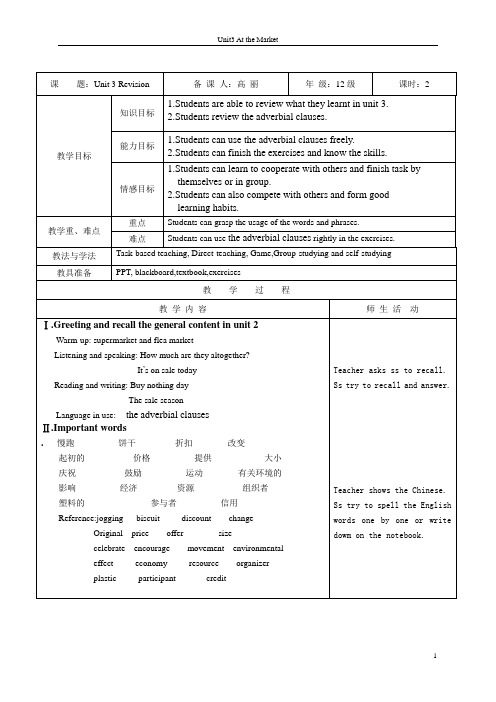
⑩All the students(被盼望着通过) the final exam.
答案:1.to but two bottles of milk and a box of biscuits
2.look around 3.a big sale
起初的_________价格_________提供_________大小_________
庆祝_________鼓励_________运动________有关环境的_________
影响________经济_______资源________组织者_________
塑料的_________参与者_________信用_________
Teacher asks ss to recall.
Ss try to recall and answer.
Teacher shows the Chinese.
Ss try to spell the English words one by one or write dowm on the notebook.
1Mike plans(去买两瓶牛奶和一包饼干)。
2I’d like to(到处看看) first.
3There is(一个大促销) in the supermarket because of the festival.
4He is a good(议价者) .He is always(对与商家讨价还价感兴趣) . So he always got the(物美价廉的商品) at last.
Ⅲ.Important phrases
1.大减价_________ 2.寻找_________ 3.尤其特别_________
凤凰职教高二英语集体备课电子教案unit3
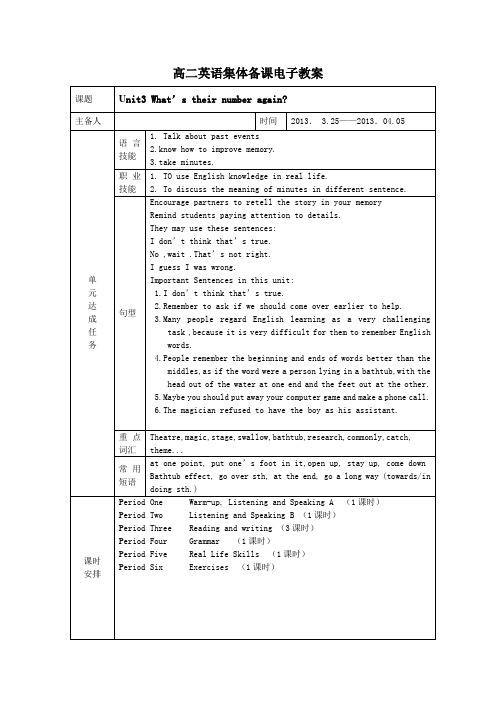
Show some pictures on the screen,these pictures including teachers,parents,friends,doctors,policemen and firemen.
Feeling Objectives:
1. To improve the students' interests in this unit.
2. To set up their confidence and memories.
教学重难点
Importance:
1. The words and phrases in this part.
2. Do the exercises in the Ex-book.
Notes:
1. Magic, magician 2.at one point /point at/point to/ point out/ on one’s point of view 3.stage on the stage/in early stages 4. Put one’s foot in it
1.Why do you think those people in Activity 1 impresses you most.
2.The boy’s mum pushed him and encouraged him to go up to the stage.
3.The magician refused to have the boy as his assistant.
While-listening
江苏凤凰职教基础模块英语二册

江苏凤凰职教基础模块英语二册简介江苏凤凰职教基础模块英语二册是江苏省凤凰职业技术学院基础模块课程的一部分。
本教材主要针对学生的英语学习需求,通过丰富的课文和练习,旨在提高学生的听说读写能力,帮助其更好地应对职业生活中的沟通和交流。
目录1.第一单元:个人信息– 1.1 自我介绍– 1.2 常用称谓– 1.3 电话交谈– 1.4 个人兴趣爱好– 1.5 询问和回答个人信息2.第二单元:家庭和朋友– 2.1 家庭成员介绍– 2.2 家庭关系– 2.3 描述家乡– 2.4 朋友圈– 2.5 描述朋友3.第三单元:工作和职业– 3.1 工作经历– 3.2 职业规划– 3.3 职业技能– 3.4 工作环境– 3.5 职业发展4.第四单元:购物和消费– 4.1 购物场景– 4.2 产品介绍– 4.3 购物方式– 4.4 支付方式– 4.5 退货和售后服务学习方法本教材采用了多种教学方法,以提高学生的英语综合应用能力。
教材中的每一个单元都包含了大量的课文、听力练习、口语练习和写作练习等。
学生可以通过听力材料来提高听力理解和口语表达能力,同时通过书写练习来提高写作能力。
此外,教材还提供了配套的教学资源,包括录音材料、练习题和参考答案,以帮助学生更好地学习和巩固所学知识。
学习目标通过学习江苏凤凰职教基础模块英语二册,学生将能够: - 熟练运用所学的词汇和语法知识进行日常生活中的交流和沟通; - 通过听力训练提高听力理解能力,能够听懂并回答与工作、家庭、朋友、购物和消费等主题相关的问题; - 能够正确使用常见的口语表达和句式结构,进行简单的口语表达; - 通过写作练习提高写作能力,能够写一篇简单的个人介绍、家庭描述、职业规划等。
使用建议以下是一些使用本教材的建议: - 学生可以按照教材的目录顺序进行学习,逐个单元地深入学习和练习,不要跳跃学习; - 根据自身学习情况和时间安排,合理安排学习进度,确保每个单元都能够充分消化和掌握; - 在学习过程中,可以多听多读多练,通过与同学和教师的交流和讨论来提高口语和听力能力; - 完成教材中的练习题,并及时查看参考答案来检查自己的答案,并纠正错误。
凤凰职教3(3)
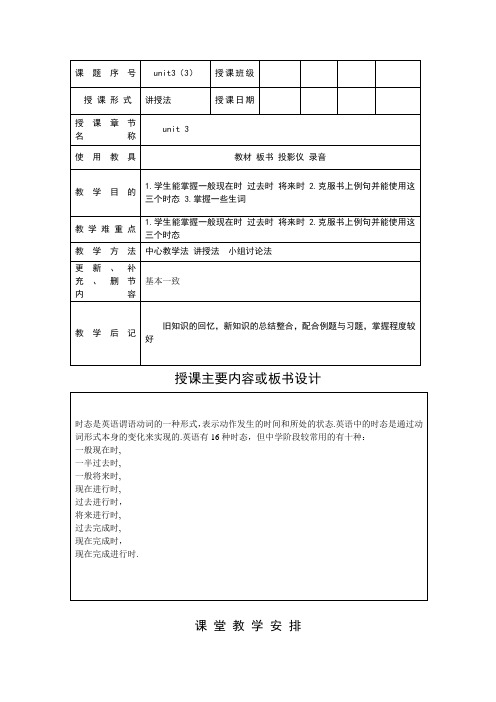
课题序号unit3(3)授课班级授课形式讲授法授课日期授课章节名称unit 3使用教具教材板书投影仪录音教学目的1.学生能掌握一般现在时过去时将来时 2.克服书上例句并能使用这三个时态 3.掌握一些生词教学难重点1.学生能掌握一般现在时过去时将来时 2.克服书上例句并能使用这三个时态教学方法中心教学法讲授法小组讨论法更新、补充、删节内容基本一致教学后记旧知识的回忆,新知识的总结整合,配合例题与习题,掌握程度较好授课主要内容或板书设计时态是英语谓语动词的一种形式,表示动作发生的时间和所处的状态.英语中的时态是通过动词形式本身的变化来实现的.英语有16种时态,但中学阶段较常用的有十种:一般现在时,一半过去时,一般将来时,现在进行时,过去进行时,将来进行时,过去完成时,现在完成时,现在完成进行时.课堂教学安排教学环节及时间分配教学主要内容与过程教法运用第一步:组织教学(5’)第二步:新课教学(65’)1.你所理解的时态是什么?2.你记得的时态有哪些?结构又是怎样的?一般现在时的用法1) 表示经常性或习惯性的动作,常与表示频度的时间状语连用。
时间状语:every…,sometimes,at…,onSunday,always,every day,usually,seldomI leave home for school at 7 every morning.2)在时间和条件状语中代替将来、表示按规定将要发生的事情(动作)状态和感觉的动作If you come does aftornoon,we will have a meeting.3)表示格言或警句中。
Pride goes before a fall.骄者必败。
注意:此用法如果出现在宾语从句中,即使主句是过去时,从句谓语也要用一般现在时。
例:Columbus proved that the earth is round..4)现在时刻的状态、能力、性格、个性。
中职英语第二册unit-3
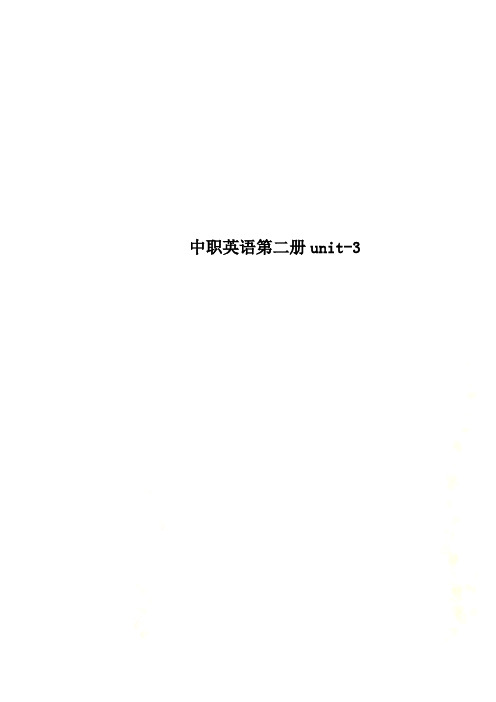
中职英语第二册unit-3江苏省中等专业学校集体备课电子教案备课组英语组主备人执教人课时安排第 1 至课时总7 课时课题Unit 3speaking课型时间年月日教学目标1. Topic: how much are they altogether?2. get information about market.3. Listen to the dialogue, know about the main idea of the dialogue, and make a simple dialogue.4. and train the ability of speaking教学重点Speaking and get the useful expressions.难How to practice and improve the student’s listening skills签发人:签发时间:年月日2设想点教法学法talking, reading and speaking教学手段Computer教学程序与策略个性化修改复习导入:some questions:Do you know the difference between Supermarket and FleaMarket?What do you want to buy? ……讲授新课:Speaking: how much are they altogether?Step one warm up1. Look at the pictures in exercise 1, ask students to talk about签发人:签发时间:年月日3them and try to understand each picture: tell the differences betweenthem.The teacher may give some help during their talking if thestudents have any difficulties.2. Ask the question to talk about the things bought or sold at thetwo marketsRead the expressions, Let students talk about them; choose thecorrect reasons. Students can add some that are not listed below ifpossibleIf the students have any difficulties, they may get some help fromtheir group or the teacher may give some help during their talking if necessary.Check the answers with class. (Key: omitted)Step two: listening and speakingFind the question asked in the conversation: (What can I do foryou? )Step three read the conversation1. Ask students to read the conversation by themselves, and thenunderline the sentences about shopping and bargaining in theconversation.(Key: omitted)2. Ask students to practice the conversation in the class.3. Useful expressions. Ask students to read the usefulexpressions, they should understand the expressions about the topic ofasking for information and possible responses4. Use the expressions you’ve learned to complete the conversationbelow.Check the answers: (Key: omitted)Step four practiceSituation: Easter is coming. You are in a supermarket and findthere is a big sale.Work in pairs and complete the conversation below.Ask students to practice the conversation.Step five Homework4签发人:签发时间:年月日签发人: 签发时间: 年 月 日5 江苏省中等专业学校集体备课电子教案Read the conversation after classRead the useful expressions again and again.教后 反思备 课 组英语组主备人执教人课时安排 第 2 至 课时 总 7 课时 课题 Unit 3 listening 课型时 间 年 月 日教学 目标1. Topic: it’s on sale today!2. Listen to the dialogue and act it out.3. Try to improve the speaking skills.教学设想重点Read the dialogue and act it out.难点Improve the speaking skills.教法学法Reading, listening and speaking教学手段Computer教学程序与策略个性化修改复习导入:List some expressions about shopping:What can I do for you?We are offering 20% off at the market. 现在打八折。
中职语文第二册第三单元练习教案
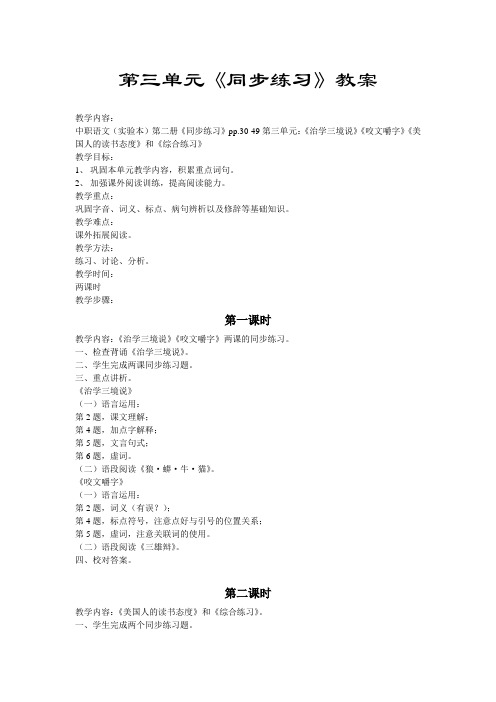
第1题,读音辨析;
第3题,成语运用;
第5题,病句辨析;
第8题,句式变换。
(二)语段阅读:《好读书》。
《综合练习》
(一)语言运用:
第4题,词语解释;
第5题,虚词;
第7题,病句辨析;
第9题,古诗理解;甚解》;
《论“入迷”》。
三、校对答案。
四、布置作业。
教学难点:
课外拓展阅读。
教学方法:
练习、讨论、分析。
教学时间:
两课时
教学步骤:
第一课时
教学内容:《治学三境说》《咬文嚼字》两课的同步练习。
一、检查背诵《治学三境说》。
二、学生完成两课同步练习题。
三、重点讲析。
《治学三境说》
(一)语言运用:
第2题,课文理解;
第4题,加点字解释;
第5题,文言句式;
第6题,虚词。
(二)语段阅读《狼·蟒·牛·猫》。
《咬文嚼字》
(一)语言运用:
第2题,词义(有误?);
第4题,标点符号,注意点好与引号的位置关系;
第5题,虚词,注意关联词的使用。
(二)语段阅读《三雄辩》。
四、校对答案。
第二课时
教学内容:《美国人的读书态度》和《综合练习》。
一、学生完成两个同步练习题。
二、重点讲析。
《美国人的读书态度》
第三单元《同步练习》教案
教学内容:
中职语文(实验本)第二册《同步练习》pp.30-49第三单元:《治学三境说》《咬文嚼字》《美国人的读书态度》和《综合练习》
教学目标:
1、巩固本单元教学内容,积累重点词句。
2、加强课外阅读训练,提高阅读能力。
教学重点:
巩固字音、词义、标点、病句辨析以及修辞等基础知识。
Module2Unit3复习课教案

此外,学生在小组讨论中表现出了较高的积极性,他们能够围绕旅行主题展开热烈的讨论,并提出自己的观点。但在成果分享环节,我发现部分学生表达不够清晰,可能是因为他们对旅行相关词汇的掌握不够熟练。为此,我打算在下一节课中,增加一些词汇复习环节,确保学生能够更准确地表达自己的思想。
(三)实践活动(用时10分钟)
1.分组讨论:学生们将分成若干小组,每组讨论一个与旅行相关的实际问题,如制定旅行计划、描述旅行经历等。
2.实验操作:为了加深理解,我们将进行一个角色扮演活动,模拟在机场、酒店等场景中使用英语进行交流。
3.成果展示:每个小组将向全班展示他们的讨论成果和角色扮演活动。
(四)学生小组讨论(用时10分钟)
在难点的处理上,我尝试通过举例和对比来帮助学生理解现在完成时态与一般过去时的区别。从课堂反馈来看,这种方法对于大多数学生是有效的。然而,仍有一些学生对此感到困惑。我考虑在课后为他们提供额外的辅导,以便他们能够更好地掌握这一难点。
《Module 2 Unit 3复习课教案》
1.教学重点
-词汇:本节课的核心词汇包括passport, destination, luggage, flight, immigration等,这些词汇是描述旅行过程的基本组成部分,需确保学生能够熟练掌握并运用。
-语法:现在完成时态是本节课的重点语法,特别是与旅行相关的句子结构,如“Have you ever been to…?”、“I have just arrived in…”等,要求学生能够准确使用。
凤凰职教第二册教案(可编辑修改word版)

(教学环节一般包括复习旧课、导入新课、讲授新课、学生操作、教师点评、归纳总结、布置作业等)(教学环节一般包括复习旧课、导入新课、讲授新课、学生操作、教师点评、归纳总结、布置作业等(教学环节一般包括复习旧课、导入新课、讲授新课、学生操作、教师点评、归纳总结、布置作业等)(教学环节一般包括复习旧课、导入新课、讲授新课、学生操作、教师点评、归纳总结、布置作业等)(教学环节一般包括复习旧课、导入新课、讲授新课、学生操作、教师点评、归纳总结、布置作业等(教学环节一般包括复习旧课、导入新课、讲授新课、学生操作、教师点评、归纳总结、布置作业等)(教学环节一般包括复习旧课、导入新课、讲授新课、学生操作、教师点评、归纳总结、布置作业等)(教学环节一般包括复习旧课、导入新课、讲授新课、学生操作、教师点评、归纳总结、布置作业等(教学环节一般包括复习旧课、导入新课、讲授新课、学生操作、教师点评、归纳总结、布置作业等)(教学环节一般包括复习旧课、导入新课、讲授新课、学生操作、教师点评、归纳总结、布置作业等)(教学环节一般包括复习旧课、导入新课、讲授新课、学生操作、教师点评、归纳总结、布置作业等(教学环节一般包括复习旧课、导入新课、讲授新课、学生操作、教师点评、归纳总结、布置作业等)(教学环节一般包括复习旧课、导入新课、讲授新课、学生操作、教师点评、归纳总结、布置作业等)(教学环节一般包括复习旧课、导入新课、讲授新课、学生操作、教师点评、归纳总结、布置作业等(教学环节一般包括复习旧课、导入新课、讲授新课、学生操作、教师点评、归纳总结、布置作业等)(教学环节一般包括复习旧课、导入新课、讲授新课、学生操作、教师点评、归纳总结、布置作业等)(教学环节一般包括复习旧课、导入新课、讲授新课、学生操作、教师点评、归纳总结、布置作业等(教学环节一般包括复习旧课、导入新课、讲授新课、学生操作、教师点评、归纳总结、布置作业等)(教学环节一般包括复习旧课、导入新课、讲授新课、学生操作、教师点评、归纳总结、布置作业等)(教学环节一般包括复习旧课、导入新课、讲授新课、学生操作、教师点评、归纳总结、布置作业等教案纸月日第7 章第5、6 课时总第课时(教学环节一般包括复习旧课、导入新课、讲授新课、学生操作、教师点评、归纳总结、布置作业等)教案纸(教学环节一般包括复习旧课、导入新课、讲授新课、学生操作、教师点评、归纳总结、布置作业等)教案纸(教学环节一般包括复习旧课、导入新课、讲授新课、学生操作、教师点评、归纳总结、布置作业等教案纸月日第8 章第5、6 课时总第课时(教学环节一般包括复习旧课、导入新课、讲授新课、学生操作、教师点评、归纳总结、布置作业等)教案纸。
凤凰职教第二册教案
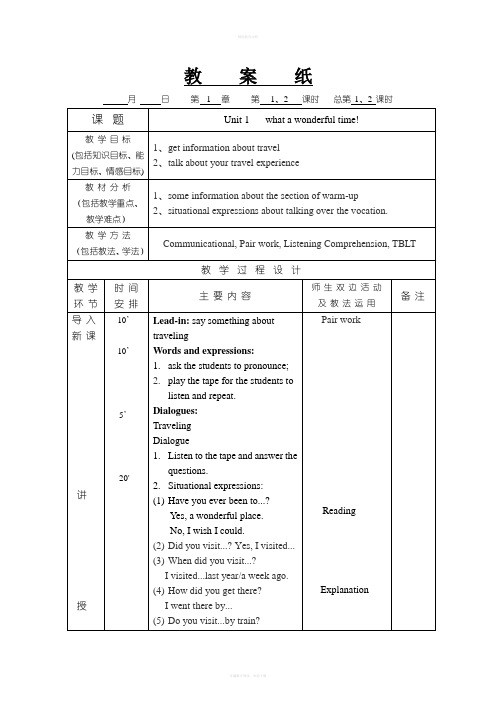
月日第 1 章第1、2 课时总第1、2 课时(教学环节一般包括复习旧课、导入新课、讲授新课、学生操作、教师点评、归纳总结、布置作业等)月日第 1 章第3、4 课时总第3、4 课时(教学环节一般包括复习旧课、导入新课、讲授新课、学生操作、教师点评、归纳总结、布置作业等月日第 1 章第5、6 课时总第5、6 课时(教学环节一般包括复习旧课、导入新课、讲授新课、学生操作、教师点评、归纳总结、布置作业等)月日第 2 章第1、2 课时总第7、8 课时(教学环节一般包括复习旧课、导入新课、讲授新课、学生操作、教师点评、归纳总结、布置作业等)月日第 2 章第3、4 课时总第9、10 课时(教学环节一般包括复习旧课、导入新课、讲授新课、学生操作、教师点评、归纳总结、布置作业等月日第 2 章第5、6 课时总第11、12 课时(教学环节一般包括复习旧课、导入新课、讲授新课、学生操作、教师点评、归纳总结、布置作业等)月日第 3 章第1、2 课时总第13、14 课时(教学环节一般包括复习旧课、导入新课、讲授新课、学生操作、教师点评、归纳总结、布置作业等)月日第 3 章第3、4 课时总第15、16 课时(教学环节一般包括复习旧课、导入新课、讲授新课、学生操作、教师点评、归纳总结、布置作业等月日第 3 章第5、6 课时总第17、18 课时(教学环节一般包括复习旧课、导入新课、讲授新课、学生操作、教师点评、归纳总结、布置作业等)月日第 4 章第1、2 课时总第19、20 课时(教学环节一般包括复习旧课、导入新课、讲授新课、学生操作、教师点评、归纳总结、布置作业等)月日第 4 章第3、4 课时总第21、22 课时(教学环节一般包括复习旧课、导入新课、讲授新课、学生操作、教师点评、归纳总结、布置作业等月日第 4 章第5、6 课时总第23、24 课时(教学环节一般包括复习旧课、导入新课、讲授新课、学生操作、教师点评、归纳总结、布置作业等)月日第 5 章第1、2 课时总第25、26 课时(教学环节一般包括复习旧课、导入新课、讲授新课、学生操作、教师点评、归纳总结、布置作业等)月日第 5 章第3、4 课时总第27、28 课时(教学环节一般包括复习旧课、导入新课、讲授新课、学生操作、教师点评、归纳总结、布置作业等月日第 5 章第5、6 课时总第29、30 课时(教学环节一般包括复习旧课、导入新课、讲授新课、学生操作、教师点评、归纳总结、布置作业等)月日第 6 章第1、2 课时总第课时(教学环节一般包括复习旧课、导入新课、讲授新课、学生操作、教师点评、归纳总结、布置作业等)月日第 6 章第3、4 课时总第课时(教学环节一般包括复习旧课、导入新课、讲授新课、学生操作、教师点评、归纳总结、布置作业等月日第 6 章第5、6 课时总第课时(教学环节一般包括复习旧课、导入新课、讲授新课、学生操作、教师点评、归纳总结、布置作业等)月日第7 章第1、2 课时总第课时(教学环节一般包括复习旧课、导入新课、讲授新课、学生操作、教师点评、归纳总结、布置作业等)月日第7 章第3、4 课时总第课时(教学环节一般包括复习旧课、导入新课、讲授新课、学生操作、教师点评、归纳总结、布置作业等月日第7 章第5、6 课时总第课时(教学环节一般包括复习旧课、导入新课、讲授新课、学生操作、教师点评、归纳总结、布置作业等)月日第8 章第1、2 课时总第课时(教学环节一般包括复习旧课、导入新课、讲授新课、学生操作、教师点评、归纳总结、布置作业等)月日第8 章第3、4 课时总第课时(教学环节一般包括复习旧课、导入新课、讲授新课、学生操作、教师点评、归纳总结、布置作业等月日第8 章第5、6 课时总第课时(教学环节一般包括复习旧课、导入新课、讲授新课、学生操作、教师点评、归纳总结、布置作业等)月日第9 章第1、2 课时总第课时(教学环节一般包括复习旧课、导入新课、讲授新课、学生操作、教师点评、归纳总结、布置作业等)。
- 1、下载文档前请自行甄别文档内容的完整性,平台不提供额外的编辑、内容补充、找答案等附加服务。
- 2、"仅部分预览"的文档,不可在线预览部分如存在完整性等问题,可反馈申请退款(可完整预览的文档不适用该条件!)。
- 3、如文档侵犯您的权益,请联系客服反馈,我们会尽快为您处理(人工客服工作时间:9:00-18:30)。
凤凰职教第二册第三单元复习课教学案in London.注:1)when还可作并列连词,其意义为“那时,这时”,相当于and at this/that time。
下列句式:sb.was doing sth.when...某人正在干某事就在这时……sb.was about to/ going to do sth.when...某人正打算干某事就在这时……sb.body has just done somesth.when...某人刚干了某事就在这时……2)when还表示原因“既然”。
如:It was foolish of you to take a taxi when you could easily walk here in five minutes.既然你可以步行五分钟就能到这儿,坐出租车来真是愚蠢。
3)while作为并列连词,意为“而,却”,表示对比。
He likes pop music,while I am fond of folk music.4)如果主句表示的是短暂动作,而从句用延续性动词的进行时态表示在一段时间内正在进行的动作时,when,while与as可互换使用。
如:When/While/As I was walking down the street,I came across an old friend of mine.我在街道上走的时候,见到了我的一个老朋友。
2.从属连词:as soon as,immediately,directly,the moment,the minute,no sooner...than...,hardly/scarcely... when...,once这些从属连词引导的从句都表示从句的动作一发生,主句的动作随即就发生,意为“一……就……”。
从句中用一般时态代替将来时态。
如:Once you remember it,you’ll never forget it.一旦你记住它,就永远不会忘记。
The moment I heard the voice,I knew father was coming.我一听到声音,就知道是父亲来了。
No sooner had we arrived at the station than the train left.我们一到达车站,车就开了。
注:no sooner...than...;hardly/scarcely...when...这一结构的时态搭配:no sooner与hardly/scarcely 引导的主句谓语动词应用过去完成时,而than与when的从句中谓语应用一般过去时。
此外,当把no sooner和hardly/scarcely提到句首时,应用倒装语序。
我一到家,天就开始下雨了。
I had hardly got home when it began to rain.→Hardly had I got home when it began to rain.3.till,until (not...until/till...直到……才) 连词用法动词意义例句till/until 主语和从句都用肯定式主句的动词为连续性动词一直到……为止I’ll stay here till/until the rain stops. not...till/until 主句用否定形式,从句用肯定形式主句的动词为非连续性动词直到……才He didn’t go home till/until he finished his homework.如Please remember to turn off all thelights before you leave the classroom.离开教室前,请记得把所有的灯都关上。
二、地点状语从句1.常用的引导词有where(在……地方),wherever(无论在什么地方)等。
指具体地点时,从句可用于主句之前或之后,表示抽象条件时,从句须放在主句之前。
如:The university graduates are determined to go wherever they are needed most.那些大学毕业生们决心去最需要他们的地方。
They are planting trees where there is plenty of water and sunlight.他们在阳光雨水充分的地方植树。
Where there is a will,there is a way.有志者事竟成。
三、条件状语从句1.常用的引导词有if(如果,假如),unless (除非,要不……就不),as long as(只要),so long as(只要),provided (that)(只要),suppose/supposing(假设),on condition (that)(如果)等。
如:I may not come to see you recently unless I can complete the project ahead of time.除非我能提前完成那个项目,否则我最近不会来看你了。
We can surely attain our goal as long as we are united as one.只要我们团结一致,我们肯定能实现我们的目标。
What shall we do if we can not get the necessary data?如果我们弄不到必要的数据,我们怎么办?They promised to let us have a meeting in their office on condition(that)we could keep it clean.如果我们能保持清洁,他们答应让我们在他们的办公室里开会。
四、原因状语从句1.常用的引导词有because因为,as由于,since既然,由于,now that既然,由于,not that...but that不是因为……而是因为……,seeing that,considering that 等。
如:He can’t deliver his lectures today because he has got a bad cold.他今天不能去讲课了,因为他患了重感冒。
I may not be able to attend your wedding party not because I’m not willing to but because I’ve been caught by something recently.我或许无法参加你的婚礼了,不是我不想去而是近来有些事情缠着我无法脱身。
五、让步状语从句引导让步状语从句的从属连词有though(虽然),although(虽然),even if(即使),even though(即使),as(尽管),while(虽然),whether...or...(无论……还是……),no matter+疑问词(无论)。
1.though或although引导让状语从句。
although与though两者意思相同,一般可互换,都可以与yet,still或nevertheless连用,但不能和but连用。
如:He is unhappy though/although he has a lot of money.虽然他有许多钱,但他并不幸福。
Although/Though it was raining hard,yet they went on playing football.尽管雨下的很大,但他们仍在继续踢足球。
注:though还可用作副词,意为“可是,然而”,置于句末。
如:He said he would come;he didn’t though.他说他会来,可是他没有来。
2.当as作“尽管,虽然”的意思讲引导让步状语从句时,从句往往放在主句的前面,而且用作让步的部分(表语、状语或动词原形)总是提前到句首。
若表语是名词,前置时要省略冠词。
如:Child as he is,he knows a lot.尽管他是孩子,他却懂得很多。
Old as he is,he is still energetic.尽管他老了,却依然精力充沛。
(表语作为让步的内容,因此提前了。
)Try as he might,he couldn’t solve the problem.尽管他很努力了,但还是无法解决这个问题。
(谓语提前了)Much as you suspected him,you couldn’t provide powerful evidence.虽然你非常怀疑他,但是你却无法提供有力的证据。
(状语作为让步的内容,因此提前了。
)3.whether...or(不管……)疑问词+ ever与no matter+疑问词(不管……,无论……)。
however(不管怎样),whatever(无论什么),whoever(无论谁)。
no matter when(how,what,who,where,which)无论何时(怎样,什么,谁,何地,哪个)等。
如:Air exists everywhere although we can’t see it.尽管我们看不见空气,但它却无处不存在。
No matter where you go on the earth,you will feel the gravity.无论你走到地球的什么地方,你都会感觉到地引力。
We’ll start our meeting on time whether he comes or not.无论他来不来,我们将准时开会。
Even if we are approaching the end of the experiment,we still have no time to lose.即使我们即将完成试验,我们依然要分秒必争。
注:whoever,whatever,whomever,whichever还可以引导名词性从句。
如:You can take whatever you like.你可以拿任何你所喜欢的东西。
六、方式状语从句常用的引导词有as(如同,按照),as if(似乎,仿佛),as though(似乎,仿佛)等。
如:He speaks English almost as a native speaker does.他的英文几乎说得如讲英语母语的人一样。
He speaks English as if he were a native speaker.他讲英文的样子似乎像说英语母语的人。
